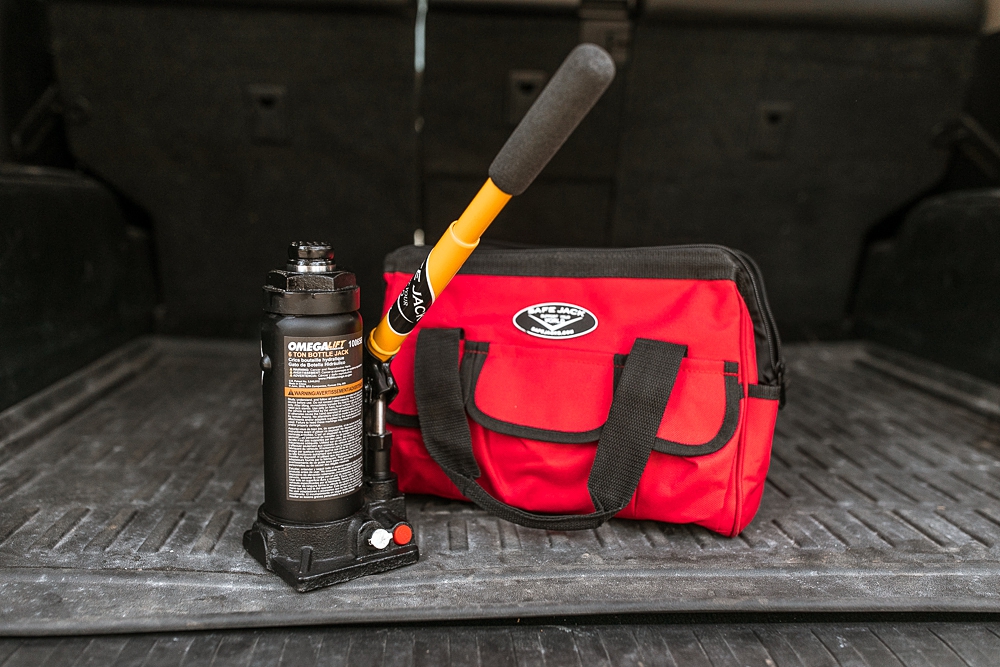Let's go through the list and maybe add some notes:
- First Aid / Trauma kit
Makes sense to have, I often heard the comment (not here), to only take what you are trained/knowledgeable to use, but since often enough you find people more qualified, but without their equipment, it might make sense to have a well sorted kit.
- fire extinguisher
Definitely a good idea to have. Add water and a reasonably sized shovel to the kit.
- Hi-Lift
Why? There rarely is a need for this if all you do is off-grid camping and it's a dangerous piece of kit. I've never needed one, but I don't go extreme routes. I use a bottle jack with an extension and some attachments:
Safe Jack Recovery Kit + 6 Ton Bottle Jack Off Road Gear Intro & Quick Test: Decrease Ground Loading for a Stable, Trail-tested Lift for the 5th Gen 4Runner

trail4runner.com
- ViAir portable compressor
Definitely.
- Rapid tire deflator
Are you deflating tires that often? I've been fine with a gauge I had that has a deflate button. Takes a few minutes longer, but really hasn't beent an issue.
- Traction boards
Yes, they are great multi-use items. Use them as roll-off blocks when using a jack, level the vehicle, use in low traction situations, bridge holes, use as secondary shovel, look cool, and so on. I have original Maxtrax, since I wanted to spend money once and be done with it. Maybe check this test:
- 2.5-5 gallon jerry can
Do you need it? Are you going far/long enough off grid to need additional fuel? If no, it's just a waste of space and additional weight you don't need. I've never needed extra fuel in the US so far. Sure, you can do routes, where it might make sense, but they are rare.
- water cans
Defintely. I normally use two smaller ones in case I either contaminate one or it leaks. I have yet to find one I actually like ...
- traction boards
Yes, get some more, they are great. ;-) – I have four.
You already mentioned you have typical camping gear, but some hints, maybe there is something in the list that helps you, it's a bit more comprehensive and you might not need any of it:
- A satellite tracker / SOS device like Spot or Garmin InReach if you go alone
- Saw, hatchet, machete, ... whatever you need remove branches, small trees from the trail or prepare firewood if fires are allowed
- Tire patch kit, replacement valve cores and caps
- Solid tool kit, at least the most common items you might need; I'm not talking about repairs, I'm talking about tightening up a bolt that has rattled lose, or some gaffers/duct tape, blank wire (e.g. to secure something where the bolt has rattled off), JB Weld, etc.
- Camping toilet, I use a waterless one with bags and chemicals
- A way to carry trash outside of your vehicle, especially if you use a "bag toilet" ...
- Lights around your vehicle, don't go fancy, just get some cheap LED lanterns so you get around camp without always having to use headlamp or flashlight, makes camping much more enjoyable, I use USB rechargeable LED pucks that can be set to different color (so I can set them to yellow/orange/red light for better night vision)
- Way of transporting fresh food, a cooler with some ice is probably good enough, I use a fridge, but it's definitely not even remotely necessary
- Bear spray, in multiple places
- A simple shower bag if you stay for more than a single night makes it soooo much more enjoyable, again, doesn't need to be fancy, a black shower bag, or a way of doing a good warm "sponge bath" make all the difference to me; I carry a privacy tent for using the toilet as well as the shower
- I have a GMRS license (just pay 70 bucks for a 10 year license and read the recommendations/rules) and a radio installed in my car; I normally only use it when going with others, but often enough you meet folks and it can come in handy for weather and possibly even help calls
- Something against insects, maybe popup mesh tent or something like that, if you go in places where humans are more often, wasps will be helping you set up camp ...
- A small brush/broom to dust off stuff you put back in the car
- I carry a recovery strap and a set of soft shackles, doesn't help me if I get stuck alone and don't have a winch, but if somebody comes along and doesn't have it either, they could still potentially help (if you trust them enough to let them help you, I would not let someone I don't know/trust do a dynamic recovery though, but slow and steady helps in many situations)
- Gloves, work gloves, heat insulating (welding) gloves, etc.







